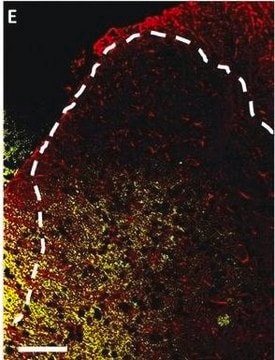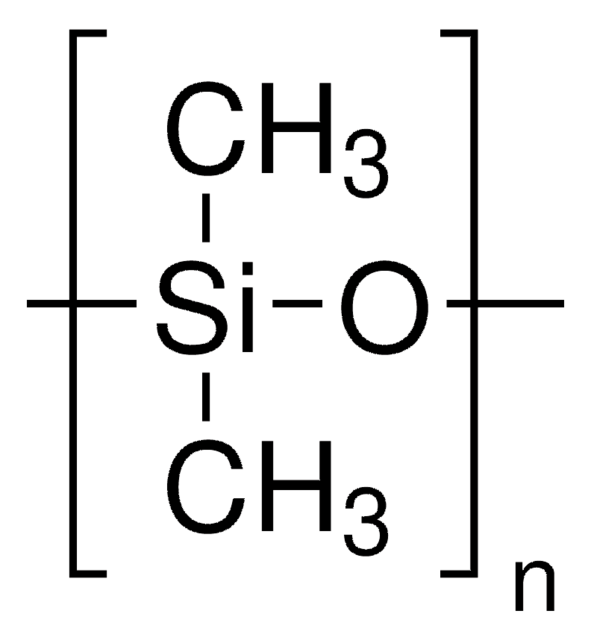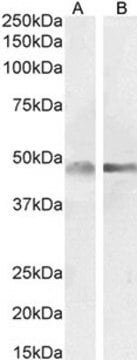14-855
Ubiquitin C-terminal hydrolase L1 (UCH-L1), 50 µg
From human cDNA, expressed in E. coli. Ubiquitin C-terminal hydrolases are a family of cysteine hydrolases that catalyze the hydrolysis of amides, esters & thioesters of the C-terminus of ubiquitin.
Sign Into View Organizational & Contract Pricing
All Photos(1)
About This Item
UNSPSC Code:
12352200
eCl@ss:
32160405
NACRES:
NA.32
Recommended Products
biological source
human
Quality Level
recombinant
expressed in E. coli
specific activity
>1000 pmol/min-μg, 25 °C (with 1 μM ubiquitin-AMC as substrate and UCH-L1 at 20 pM (0.54 ng/mL).)
mol wt
Mw 24.8 kDa
manufacturer/tradename
Upstate®
NCBI accession no.
UniProt accession no.
shipped in
dry ice
General description
Produced from human cDNA, expressed in E. coli. Ubiquitin C-terminal hydrolases (UCHs) are a family of cysteine hydrolases that catalyze the hydrolysis of amides, esters and thioesters of the C-terminus of ubiquitin. Mammalian neuronal cells abundantly express a deubiquitylating enzyme, ubiquitin carboxy-terminal hydrolase 1 (UCH-L1). Mutations in UCH-L1 are linked to Parkinson′s disease as well as gracile axonal dystrophy (gad) in mice. In contrast to the universally expressed UCH-L3 isozyme, UCH-L1 is expressed exclusively in neurons and testis/ovary. It has been shown that UCH-L1 associates and co-localizes with monoubiquitin and elongates ubiquitin half-life and the suggestion is made that UCH-L1, with avidity and affinity for ubiquitin, ensures ubiquitin stability within neurons.
Product Source: Recombinant human UCH-L1 expressed in E. coli
Storage and Stability
As supplied, store at -80°C for up to 12 months from date of receipt. Avoid repeated freeze/thaw cycles. After initial defrost, aliquot (for extended storage it is recommended that aliquots be no smaller then 10 μL) and store at -80°C. Snap-freezing in a dry ice/ethanol bath or liquid nitrogen is recommended. As supplied, the enzyme is stable on ice for several hours.
Legal Information
UPSTATE is a registered trademark of Merck KGaA, Darmstadt, Germany
Disclaimer
Unless otherwise stated in our catalog or other company documentation accompanying the product(s), our products are intended for research use only and are not to be used for any other purpose, which includes but is not limited to, unauthorized commercial uses, in vitro diagnostic uses, ex vivo or in vivo therapeutic uses or any type of consumption or application to humans or animals.
Storage Class Code
12 - Non Combustible Liquids
WGK
WGK 1
Flash Point(F)
Not applicable
Flash Point(C)
Not applicable
Certificates of Analysis (COA)
Search for Certificates of Analysis (COA) by entering the products Lot/Batch Number. Lot and Batch Numbers can be found on a product’s label following the words ‘Lot’ or ‘Batch’.
Already Own This Product?
Find documentation for the products that you have recently purchased in the Document Library.
C N Larsen et al.
Biochemistry, 35(21), 6735-6744 (1996-05-28)
Ubiquitin C-terminal hydrolases (UCH's) are a newly-defined class of thiol proteases implicated in the proteolytic processing of polymeric ubiquitin. They are important for the generation of monomeric ubiquitin, the active component of the eukaryotic ubiquitin-dependent proteolytic system. There are at
I N Day et al.
The Biochemical journal, 268(2), 521-524 (1990-06-01)
Database search using a bovine thymus ubiquitin C-terminal hydrolase sequence indicated 54% sequence identity with the abundant human neuron-specific protein gene product 9.5 (PGP9.5), which was then shown to possess the same activity [Wilkinson, Lee, Deshpande, Duerksen-Hughes, Boss & Pohl
Kinetic and mechanistic studies on the hydrolysis of ubiquitin C-terminal 7-amido-4-methylcoumarin by deubiquitinating enzymes.
Dang, L C, et al.
Biochemistry, 37, 1868-1879 (1998)
I N Day et al.
FEBS letters, 210(2), 157-160 (1987-01-05)
The co-ordinate sequencing of the human neuronal and neuroendocrine marker protein PGP 9.5 and its cDNA is described. The cDNA encodes the complete protein (212 amino acids), and the 340 nucleotide 3'-noncoding region including the polyadenylation signal, indicating an mRNA
Yichin Liu et al.
Cell, 111(2), 209-218 (2002-11-01)
The assumption that each enzyme expresses a single enzymatic activity in vivo is challenged by the linkage of the neuronal enzyme ubiquitin C-terminal hydrolase-L1 (UCH-L1) to Parkinson's disease (PD). UCH-L1, especially those variants linked to higher susceptibility to PD, causes
Our team of scientists has experience in all areas of research including Life Science, Material Science, Chemical Synthesis, Chromatography, Analytical and many others.
Contact Technical Service








